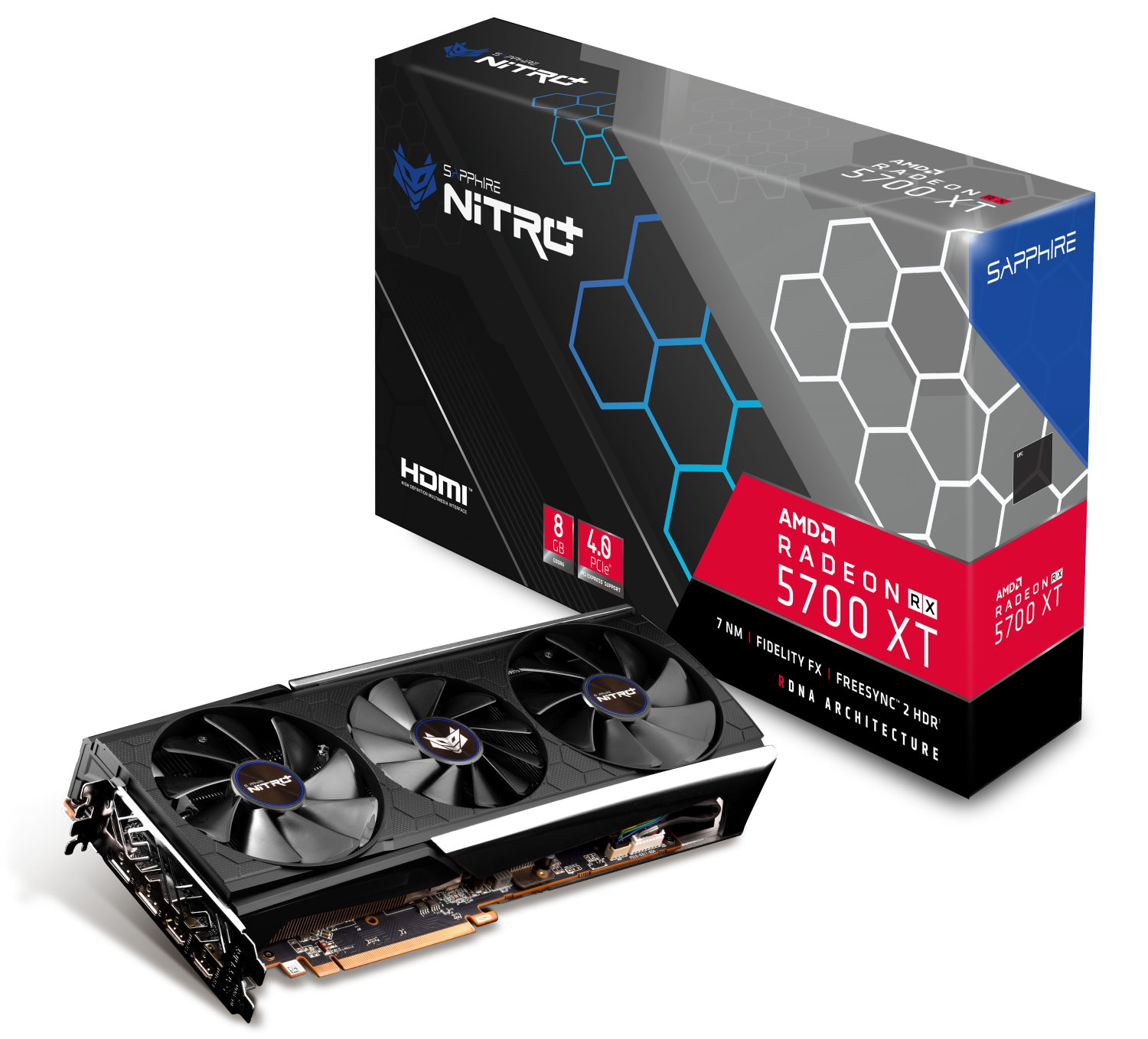Why you can trust Tom's Hardware
AMD’s Radeon RX 5700 XT is a good mid-range card that delivers a strong 2560 x1440 gaming experience and high fps gaming at 1080p. While it isn’t quite a 4K UHD card, some titles are playable with all the eye-candy enabled while others will need some adjustment.
Sapphire took the card to a different level by upgrading the PCB and power delivery along with using a more effective and quiet cooler than the reference models with the Tri-X cooling solution. The large and mismatched sized fans offer good air flow and do so without being the loudest item in your system. The Tri-X cooling solution managed to stay fairly quiet throughout our testing. Though audible, there wasn’t any appreciable whine or hum coming from the fans outside of the wind noise that it generated.
Sapphire increased the clocks from reference speeds of 1605/1755/1905 (Base/Game/Boost, respectively) to 1670/1815/2010 on the Nitro+. This is a lot faster than the Gigabyte RX 5700 XT Gaming OC, though the latter is less expensive. The clocks are one of the fastest available (The ASRock Taichi OC+ holds that crown).
To that end, the price for the Sapphire Nitro+ Radeon RX 5700 XT is currently $469.99 at Newegg with the Gigabyte we compared it to priced at $419.99. For the $50 difference, users get a faster card by a few percent on average, and a better cooling solution. If you need to save a few dollars, the PowerColor Red Devil sports the same clock speeds and solid cooling. With that said, I would like to see the Nitro+ priced just a bit lower. It was released at $440 but the price has gone up a little since that time. Surely a sale from any of the major etailers will bring it back down.

Overall the Sapphire Nitro+ Radeon RX 5700 XT performed well against the lower, reference clocked card as to be expected. In GPU-heavy titles, the higher clock speeds showed several percent difference, while in less demanding titles, that gap shrinks. Sapphire’s Tri-X cooling solution kept the card cool under load and did so without sounding like an airplane with propellers taking off. Priced at $469, it is one of the more expensive Radeon RX 5700 XT cards out there, trumped only by the new ASRock RX 5700 XT Taichi OC+.
Besides price, the only concern with the card is the size. Because it is longer than t over 12-inches it won’t fit some cases. . Outside of that, performance was good as well as the cooling solution. If you need a quiet RX 5700 XT with robust cooling, premium styling and some of the fastest overclocks out of the box, the Sapphire Nitro+ falls on the shortlist of cards we’d want.
Get Tom's Hardware's best news and in-depth reviews, straight to your inbox.
For those looking for something much more affordable, the AMD has also announced a Navi-based RX 5500 that the company says will come in desktop form and compete with the GTX 1650 and 1660. And if you're looking for a card that can better handle 4K, recent mentions of Navi 22 and Navi 23 in a recent Linux driver (first spotted by 3DCenter forum veteran Berniyh) may (or may not) be our first glimpse of higher-end AMD GPUs that could compete with Nvidia's RTX 2080 Super and 2080 Ti.
MORE: Best Graphics Cards
MORE: Desktop GPU Performance Hierarchy Table
MORE: All Graphics Content

Joe Shields is a staff writer at Tom’s Hardware. He reviews motherboards and PC components.
-
HideOut They specs chart shows the same memory bandwidth as the stocker but with the factory OC it should be higher, much like the TFlops calculation. Sounds like a nice card, but paying a huge premium for what, 3-5% more speed? Doesn't sound like a great buy though.Reply -
King_V Well, you're paying for more than just the extra speed - also for a very well engineered, quiet cooling solution, as well as better regulation, etc.Reply
Though, I do have to agree - I like quiet, and will pay extra for it, but I'm not sure I'd pay that much of premium for it. I might, but then it was mentioned that the Power Color variant has a good cooler and a bit lower of a price.
A nice card, but, not sure it justifies the premium. -
Loadedaxe Once you pass this price point there is no need to go AMD. Might as well get a 2070Reply
I have been waiting for the custom aibs for the 5700, and minus the PC Red Devil, I am completely disappointed. However, I wont buy a Power Color, I have been burnt by them twice.
Lets see what the MSI Gaming X looks like when it lands price wise. I may just jump ship this round. -
King_V ReplyLoadedaxe said:Once you pass this price point there is no need to go AMD. Might as well get a 2070
The 2070 non-super generally performs less than the 5700XT, so why, if the prices were about the same, would anyone choose the lesser performing card? -
waltc3 My Built-by-AMD 50th Ann 5700XT sports significantly higher boost clocks, and costs $20 less....I have zero problems with it.Reply -
Loadedaxe Reply
I was referring to the super. Its $40 more.King_V said:The 2070 non-super generally performs less than the 5700XT, so why, if the prices were about the same, would anyone choose the lesser performing card? -
King_V Gotcha. Not sure I'd go to the 2070 Super over the Sapphire, not enough performance gain to justify the $499 price of entry.Reply
Then again, I'm thinking the premium for the Nitro+ is also probably more than I'd be willing to pay for it. I'm 2 for 2 on PowerColor success, though, so that brand wouldn't make me hesitant.
Come to think of it, I haven't ever having a new video card I've bought fail on me. Used ones, either, with only 3 exceptions - two dead when I got them (both Nvidia), and one that worked, but had slightly blurry output (back when CRTs and VGA output was still fairly common), also Nvidia. Still, given the number of used cards I'd come across, and the "who knows what the heck the previous owner did" state of the ones that did fail, I'm confident in all video cards in general. -
Regulus Star* In the last few days we have now started to see prices fall at a few retailers with the lowest price I've seen being £429.99 these new lower prices should start to tip the scales even more when comparing against alternative brands & architecture. And not to mention the price to performance ratio.Reply -
Big Nish I purchased this card to replace my reference 5700XT and, while it is a good card in many respects, it suffers from the same technical flaw as my original Sapphire RX480 Nitro+. The heat sink is simply not large enough to passively maintain a fixed low GPU temp under desktop conditions, which makes the fans come on periodically. Under desktop conditions the GPU temps steadily climbs up to 59degC and then the fans come on until the temp drops down to 49degC at which point the fans stop. Then the cycle constantly repeats: the GPU temp steadily climbs back up to 59degC and the fans come back on and then off once it reaches 49degC again. As mentioned this is just using desktop applications such as Word/Outlook or browsing etc which, according to Sapphire's claim, should see no fans coming on. The time it takes between fan off to fan on is approx. every 3.5 minutes. This fan on/off cycling is really annoying - its actually more annoying than the constant low level fan noise of eh reference card - and makes Sapphire's the 'fan stop at idle' claim misleading. Please note that I am currently using the card's quiet BIOS and have an HP 1440p monitor with a fixed 75Hz refresh rate. I have also tried lowering my monitor to a 60Hz refresh, but the card exhibits the same fan on/off cycling. GRRRR. My Sapphire VEGA 64 Nitro+ was able to stay cool enough under all desktop conditions that the fans never came on. I think Sapphire should have used the exact same heat sink for the RX 5700 XT. Unfortunately, this fan cycling in the desktop has spoilt my enjoyment of this card quite a bit.Reply